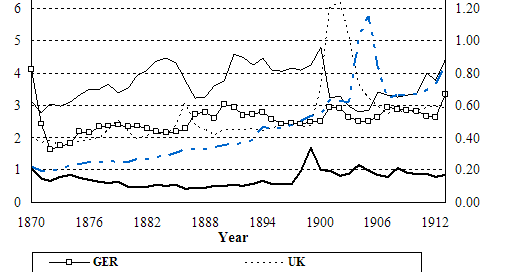Over the past week, Chinese military aircraft have entered Taiwan’s defence airspace (which is not the same as its national airspace, by the way) no less than four times. Some aeroplanes even exited Taiwan’s defence airspace along the Bahi Channel which is of extreme geopolitical importance. The Bashi Channel connects the Pacific with the South China Sea and is the main shipping route for cargo ships between East Asia and the West Coast of the United States as well as the location of several main undersea cables that are the foundation of global communication systems.
This was clearly intended as a show of force to the world. Does it mean that we are witnessing the start of an escalating conflict that might end in a military conflict or a blockade of the South China Sea? I think not. At least not yet.
But it reminds me of crucial mistakes that contributed to the outbreak of World War I. Back in 1898, Germany had the world’s most formidable land army but a weak navy. Meanwhile, the British Empire’s global influence rested on the unassailable might of the Royal Navy. In 1898, the second-worst political leader Germany ever had, Kaiser Wilhelm II, was no longer advised by the political genius of Otto von Bismarck and decided to try to challenge the British Empire. Under Admiral von Tirpitz, German military expenditures were directed mostly to the navy in order to build more and more modern ships that could challenge British supremacy on sea.
While military expenditures overall remained largely constant, this German pivot led to an arms race between the British and the Germans over the coming decade that would sour British political leaders to Germany and tipped British sympathies in favour of France and Russia which ended in the Triple Entente and British involvement in World War I on the side of France and Russia.
Military expenditure as share of total government expenditure pre-World War I
Source: Eloranta 2005. Note System total = 16 largest military powers.
Today, China has the world’s largest army by conscription and the People’s Liberation Army is possibly the world’s mightiest land army. Meanwhile, the US Navy and Air Force are unassailable and guarantee US military supremacy around the globe. But while official military expenditure as a share of total government expenditure is declining, the Chinese are rapidly modernising their navy and air force and have entered an arms race with the United States in crucial 21st weapon technologies like drones, submarines, and military AI.
Military expenditure as a share of total government expenditure
Source: World Bank
Today, China’s navy and air force are too weak to challenge the United States and launch an outright assault on Taiwan or a blockade of the island. But in my view, China is catching up quickly and I wouldn‘t be surprised if, within this decade, China’s military can achieve parity with the United States on a regional basis.
And once that is achieved, the room for error is dramatically reduced.
Note that the United States has just suffered a massive defeat with its botched exit from Afghanistan after a long and costly war that couldn’t be won. US military supremacy in the world is increasingly questioned due to its military failures in Iraq and Afghanistan.
Similarly, the early losses of the British Army against a relatively untrained and unsophisticated army of farmers in the Second Boer War marked the end of unquestioned military supremacy of the British Empire. And let’s not forget the rather embarrassing ‘victory’ of the British in Afghanistan in 1880 or the need for an alliance of eight western armies to defeat the Boxer Rebellion in 1900.
It is only a matter of time until a rising Chinese military might miscalculate and decide to test US resolve to defend Taiwan. Just like the British Empire didn’t have a formal treaty with France and Russia to come to their aid should they be attacked by Germany, Taiwan and the United States have no formal defence alliance either. Chinese military leaders may think that the United States would shy away from military confrontation and thus make a crucial mistake that could lead to a rapid escalation of tensions to the point of war.
But as I said above, I think we are not at that point, yet. So far, Chinese leadership has been cautious not to escalate the situation too much to cross any red lines. But with waning US military leadership and a declining power gap in the South China Sea these red lines will become fainter over time.






The economics and logistics of conflicts are often downplayed in their analysis. James Holland’s excellent books on the war on the western front 1939-45 look at the impact these factors had as well as the usual political and military analysis. It throws a different light on how one views outcomes.
Did Putin "miscalculate" when he tested U.S. resolve to defend Ukraine? Turns out the Budapest Memorandum was "non-binding." I fear that you are right and the Taiwan Relations Act will be similarly tested.